The problem with anthology films is that they sometimes insist on creating a thin narrative to wrap their short stories up in a neat bow at the end. And so Green Lantern: Emerald Knights, which would be a great name for a TV series, crafts a looming threat and leaves the last ten minutes, or so, to witnessing the entirety of the Green Lantern Corps destroying the big-baddie.
The problem with any anthology film is that it’s hard to craft engaging and interesting stories for each of the segments, there’s always bound to be some that just aren’t very good. But this problem is particularly bad with Emerald Knights as the entire film feels like an extended pilot episodes for a series that never got made. C’mon now, even The Simpsons dropped the wraparound narrative for their “Treehouse of Horror” episodes. The overarching story would have been more successful as its own series, seeing Hal Jordan take a newbie under his guidance and helping them develop their skills all the while they’re introduced to the wider world at large sounds like fertile material. So where did it go wrong? It’s not an introduction to an animated series; it was released in conjunction with the failed attempt at a feature-length live action film. I guess this was to help explain some of the universe and characters to those who were fresh to the material?
The point is, it’s only interesting by half. Namely the segments focusing in on Avra, Kilowog and Abin Sur. Avra’s story alone would have made a great twenty-two minute episode explaining the origins of the Lantern Corps, why the color green was chosen, etc. It’s a successful short film, but there’s a wealth of information to process and characters to expand upon. With a universe as diverse and interesting in the Green Lantern comics, I don’t know why DC/WB don’t try to make more of these films about it instead of going back-and-forth between the well represented Batman and Superman stories. Sure, we got tiny glimpses in Justice League/Justice League Unlimited, the brief animated series and the live action film, but there’s still more to explore and examine. And for that matter, why haven’t we explored the mythologies of Wonder Woman, Aquaman, Hawkman, Martian Manhunter, Flash and everyone else seemingly who isn’t Batman or Superman? It just seems unfair.
Green Lantern: Emerald Knights
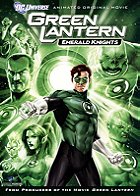 Posted : 11 years, 11 months ago on 8 July 2013 06:18
(A review of Green Lantern: Emerald Knights)
Posted : 11 years, 11 months ago on 8 July 2013 06:18
(A review of Green Lantern: Emerald Knights) 0 comments, Reply to this entry
0 comments, Reply to this entry
Two Girls and a Sailor
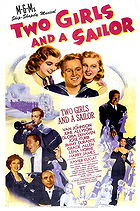 Posted : 11 years, 11 months ago on 8 July 2013 06:18
(A review of Two Girls and a Sailor)
Posted : 11 years, 11 months ago on 8 July 2013 06:18
(A review of Two Girls and a Sailor)Not really sure how this scored a Best Original Screenplay Oscar nomination, but as far as all-singing/all-dancing movies with barely there plots go, this one is pretty damn solid from start to finish. It seems to find a ratio of plot-advancing scenes to musical numbers that keeps things moving along sufficiently enough, never really bogging you down with too much of one or the other at any given time. Just when we think, “Hey it’s been a minute or two since we last had a performance,” we’re treated to one. This isn’t to say it’s any kind of endearing masterpiece, but it’s a lovely and sweet movie filled to the brim with great guest stars.
The plot will probably take me no more than three sentences to describe: Two sisters (Gloria DeHaven and June Allyson) are in showbiz and dream of opening a canteen to entertain soldiers. They meet a secretly wealthy one who bankrolls their dream, and they soon find themselves in a love triangle. In the end, both the sisters get a dreamy soldier and the canteen is a rousing success. Hell, I probably didn’t even need that last sentence, since I’m going to assume that everyone knew going into this that a happy ending was the only true outcome for a musical comedy revue.
If anything, two hours is too bloated a runtime for such a thin exercise in moviemaking as the film does begin to overstay its welcome towards the end. We all know DeHaven is going to be the lucky girl who winds up with Tom Drake while Allyson will get Van Johnson. That’s no surprise, but Two Girls and a Sailor does bring on the cavalcade of stars. Some of my favorite sequences include Allyson’s “Young Man With a Horn,” DeHaven’s steamy “My Mother Told Me,” Lena Horne bringing her magic touch to “Paper Doll,” Virginia O'Brien hijacking "Take It Easy," "Rumba Rumba" by Xaiver Cugat and His Orchestra, Jimmy Durante doing "Inka Dinka Doo," and Grace Allen in “Concerto for Index Finger.” Allen’s number is the best thing in the entire film, as to why someone playing the piano with only their index finger is so damn funny? I couldn’t tell you, but Gracie Allen was just a comedic great along with her equally famous husband. Two Girls and a Sailor has all the same problems as most of these morale-boosting musical revues of the era, but it’s also a little better than most and gives you a visual definition of the phrase: That’s entertainment.
The plot will probably take me no more than three sentences to describe: Two sisters (Gloria DeHaven and June Allyson) are in showbiz and dream of opening a canteen to entertain soldiers. They meet a secretly wealthy one who bankrolls their dream, and they soon find themselves in a love triangle. In the end, both the sisters get a dreamy soldier and the canteen is a rousing success. Hell, I probably didn’t even need that last sentence, since I’m going to assume that everyone knew going into this that a happy ending was the only true outcome for a musical comedy revue.
If anything, two hours is too bloated a runtime for such a thin exercise in moviemaking as the film does begin to overstay its welcome towards the end. We all know DeHaven is going to be the lucky girl who winds up with Tom Drake while Allyson will get Van Johnson. That’s no surprise, but Two Girls and a Sailor does bring on the cavalcade of stars. Some of my favorite sequences include Allyson’s “Young Man With a Horn,” DeHaven’s steamy “My Mother Told Me,” Lena Horne bringing her magic touch to “Paper Doll,” Virginia O'Brien hijacking "Take It Easy," "Rumba Rumba" by Xaiver Cugat and His Orchestra, Jimmy Durante doing "Inka Dinka Doo," and Grace Allen in “Concerto for Index Finger.” Allen’s number is the best thing in the entire film, as to why someone playing the piano with only their index finger is so damn funny? I couldn’t tell you, but Gracie Allen was just a comedic great along with her equally famous husband. Two Girls and a Sailor has all the same problems as most of these morale-boosting musical revues of the era, but it’s also a little better than most and gives you a visual definition of the phrase: That’s entertainment.
 0 comments, Reply to this entry
0 comments, Reply to this entry
I Married a Witch
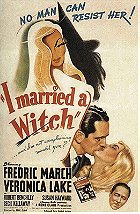 Posted : 12 years ago on 26 June 2013 06:53
(A review of I Married a Witch (1942))
Posted : 12 years ago on 26 June 2013 06:53
(A review of I Married a Witch (1942))I Married a Witch is pure 1940s screwball no matter the amount of occult drapery that has been added to adorn the edges. It boils down to the major tropes of the genre: mistaken identities, a loopy yet dominating female presence romancing more subservient male presence, farcical sight gags and numerous physical comedy bits. It’s the kind of light-weight charm that movies nowadays never seem to possess, perhaps because something like this has been deemed too old-fashioned.
I Married a Witch opens with a title card telling us that we’re being placed into a world that exists in a fairy tale like state, essentially beginning the movie with a title that reads “Once upon a time…” in spirit more so than the actual words. It then goes on to deliver a series of sight-gags and running jokes that clearly draw a line from here to the “Fractured Fairy Tales” of Rocky and Bullwinkle to the diminishing returns of the Shrek franchise. For a film made in 1942, there’s a surprising amount of “current” and “modern” humor involved in the whole thing.
And the film works best when it just sits back and lets Veronica Lake charm, scheme, seduce and prove the enigmatic allure of a golden peek-a-boo bang. Witch would've sunk or swam depending on Lake’s performance, and she proves herself to be a highly gifted comic actress, steering the film into pure escapist whimsy. The plot, which is pretty much laid out in the title, is more like bits of plumbing laid down to allow for her central, life-giving performance to flow through the various humorous bits and pieces.
The only major problem occurs in the last act of the film in which the writers randomly decided that the film needed a big bad to overcome. And while Cecil Kellaway is a funny, naughty warlock, his transformation into a revenge-seeking sprite isn’t entirely necessary. The whole movie was built upon the screwball principles of two characters from opposite sides falling for each other while zany antics whiz past them. The introduction, especially so late in the game, of a villainous character proves more distracting than anything.
Yet I Married a Witch still charmed the pants off of me. I smiled and giggled the whole time. I’d never seen Lake in anything outside of Sullivan’s Travels and thought she always played that kind of tough-talking pixie girl, so it was a pleasant surprise to see her here let loose and deliver a more flirty and fun performance. Truth be told, it’s really got no right to be even remotely good given how loony the premise of it is, but with a brisk pace and only 75 minutes, a strong cast and some smart jokes, Witch has to be some kind of minor screwball classic.
I Married a Witch opens with a title card telling us that we’re being placed into a world that exists in a fairy tale like state, essentially beginning the movie with a title that reads “Once upon a time…” in spirit more so than the actual words. It then goes on to deliver a series of sight-gags and running jokes that clearly draw a line from here to the “Fractured Fairy Tales” of Rocky and Bullwinkle to the diminishing returns of the Shrek franchise. For a film made in 1942, there’s a surprising amount of “current” and “modern” humor involved in the whole thing.
And the film works best when it just sits back and lets Veronica Lake charm, scheme, seduce and prove the enigmatic allure of a golden peek-a-boo bang. Witch would've sunk or swam depending on Lake’s performance, and she proves herself to be a highly gifted comic actress, steering the film into pure escapist whimsy. The plot, which is pretty much laid out in the title, is more like bits of plumbing laid down to allow for her central, life-giving performance to flow through the various humorous bits and pieces.
The only major problem occurs in the last act of the film in which the writers randomly decided that the film needed a big bad to overcome. And while Cecil Kellaway is a funny, naughty warlock, his transformation into a revenge-seeking sprite isn’t entirely necessary. The whole movie was built upon the screwball principles of two characters from opposite sides falling for each other while zany antics whiz past them. The introduction, especially so late in the game, of a villainous character proves more distracting than anything.
Yet I Married a Witch still charmed the pants off of me. I smiled and giggled the whole time. I’d never seen Lake in anything outside of Sullivan’s Travels and thought she always played that kind of tough-talking pixie girl, so it was a pleasant surprise to see her here let loose and deliver a more flirty and fun performance. Truth be told, it’s really got no right to be even remotely good given how loony the premise of it is, but with a brisk pace and only 75 minutes, a strong cast and some smart jokes, Witch has to be some kind of minor screwball classic.
 0 comments, Reply to this entry
0 comments, Reply to this entry
Magnificent Obsession
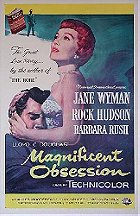 Posted : 12 years ago on 26 June 2013 06:53
(A review of Magnificent Obsession)
Posted : 12 years ago on 26 June 2013 06:53
(A review of Magnificent Obsession)Sometimes you’ve really got to wonder why certain books become a major phenomenon and get adapted into two different movies. By all accounts that I’ve read, this second version directed by Douglas Sirk, the master of melodrama, is the better film simply because Sirk was piloting the thing.
To be completely honest, as big fan of Douglas Sirk’s later works like All That Heaven Allows, Written on the Wind and Imitation of Life, Obsession can’t compete with those three big boys. But it does mark the turning point from which he flipped from solid “women’s picture” director to subversive and sly satirist of the 1950s American lifestyle. Those films maintain their black-hearted power and jaundiced worldviews after all of this time, while Obsession feels the transitional period that it so clearly is. It’s entertaining to be sure, but it’s also, even for a Sirk melodrama, completely, utterly, totally and wildly ludicrous and ridiculous.
Having taken a dime store trashy romance and spun out an exquisitely textured, deliciously acted yet still trashy film, Obsession is nothing but pure entertainment. The kind of film that paved the way for night-time soap operas that we consume like junk food and then tell everyone we “hate-watch” or view “ironically.” There is no such thing, and gone are any notions of good-taste or even logically narrative transitions. This film has turned up its emotionality and tear-jerking impulses to 11 and will make you feel something by the end of it.
Come to think of it, if someone can kind the highly entertaining value of Obsession worth a look then they’re probably ready to move on to Sirk’s deeper, darker and more twisted dissertations on consumerism, social constructs, greed and race in America. Think of this as a litmus test for his brand of cinema.
To try and rehash the plot would take forever, and frankly the whole thing makes zero logical sense. It involves several accidents; a case of blindness, miracle surgeries, reformed playboy, an older widow, love conquers all, and vague crpto-Christian mysticism floating over the whole thing. I found myself constantly having to quiet the logical part of my brain, but, at the same time, I was wildly amused by how insane the whole thing is. The colors are bright and vibrant, the interiors are immaculately decorated, and Rock Hudson and Jane Wyman give solid central performances that almost make the whole thing believable. It’s a strange, bizarre film, but it’s all the better for it.
To be completely honest, as big fan of Douglas Sirk’s later works like All That Heaven Allows, Written on the Wind and Imitation of Life, Obsession can’t compete with those three big boys. But it does mark the turning point from which he flipped from solid “women’s picture” director to subversive and sly satirist of the 1950s American lifestyle. Those films maintain their black-hearted power and jaundiced worldviews after all of this time, while Obsession feels the transitional period that it so clearly is. It’s entertaining to be sure, but it’s also, even for a Sirk melodrama, completely, utterly, totally and wildly ludicrous and ridiculous.
Having taken a dime store trashy romance and spun out an exquisitely textured, deliciously acted yet still trashy film, Obsession is nothing but pure entertainment. The kind of film that paved the way for night-time soap operas that we consume like junk food and then tell everyone we “hate-watch” or view “ironically.” There is no such thing, and gone are any notions of good-taste or even logically narrative transitions. This film has turned up its emotionality and tear-jerking impulses to 11 and will make you feel something by the end of it.
Come to think of it, if someone can kind the highly entertaining value of Obsession worth a look then they’re probably ready to move on to Sirk’s deeper, darker and more twisted dissertations on consumerism, social constructs, greed and race in America. Think of this as a litmus test for his brand of cinema.
To try and rehash the plot would take forever, and frankly the whole thing makes zero logical sense. It involves several accidents; a case of blindness, miracle surgeries, reformed playboy, an older widow, love conquers all, and vague crpto-Christian mysticism floating over the whole thing. I found myself constantly having to quiet the logical part of my brain, but, at the same time, I was wildly amused by how insane the whole thing is. The colors are bright and vibrant, the interiors are immaculately decorated, and Rock Hudson and Jane Wyman give solid central performances that almost make the whole thing believable. It’s a strange, bizarre film, but it’s all the better for it.
 0 comments, Reply to this entry
0 comments, Reply to this entry
Animal Farm
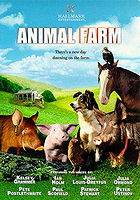 Posted : 12 years ago on 25 June 2013 06:55
(A review of Animal Farm (1999))
Posted : 12 years ago on 25 June 2013 06:55
(A review of Animal Farm (1999))Oh god, I don’t even know what to say about this one. Personally I blame the involvement of Hallmark in this atrocity. Having watched numerous other mini-series and TV movies that produced in the mid-to-late 90s, I can safely say that as they went along they just kept trying to make them more and more kid-friendly. Animal Farm, despite featuring talking animals, is not exactly a warm-fuzzy family-friendly piece of entertainment. The novel details the revolution of the barnyard creatures against their unseen master(s) and eventually destruction from power-hungry forces within. It’s a scenario that plays and replays throughout history, one need not read too far back in world news to find an example.
The mistake here is that they mistook it for a novel exclusively about Stalin and Lenin. So the falsely optimistic framing device, which sees the new owners and return journey of the animals that fled as a comment upon the fall of the Berlin Wall and the end of the Cold War, stands in glaring contrast for the lie that it is. Yes, Animal Farm was an allegory for the situation in Russia at the time, but it could easily stand-in for just about any revolution that went south shortly after.
That’s just the beginning of the problems with the film. A lack of understanding of the source material is a glaring enough problem, but filling in the roles with stunt-casting of various big name stars and having them all sound fairly generic is even worse. Only Patrick Stewart and Kelsey Grammer’s specific deep tones and musical cadences standout as Napoleon and Snowball, everyone else sounds like random assorted voice actors reading from the script with relatively little emotion.
Another problem comes from the insistence on giving us a central character who bears a highly similar function and personality to that of Border Collie in Babe. A female border collie with a sweet English accent and who lives on a farm, coming only a few years after the original and one year after the sequel, this feels like they’re trying to piggyback on the success of others. It doesn’t work, mainly because her puppies are then taken and used as the guard dogs. Border Collie’s don’t exact instill fear, and it just goes back to my point of Hallmark trying to make everything they touch overtly kid-friendly.
Of course, much of this could have been forgiven if the animation of the animals had been any good, but it’s not. The animatronic pigs are obviously fake and don’t synch properly with their spoken words. They also move in an inelegant, jerky manner that one doesn’t expect from Jim Henson’s Creature Shop. The CGI mouths on the rest of the animals are embarrassingly bad, appearing too rubbery or looking glued on over the actual image of the real animal. The donkey alone wouldn’t make it past the test stage for an amateur product as it looks like a bizarre stuffed animal.
Yet Animal Farm offers us one neat piece of artistic license with the material. However you feel about it, the use of propaganda films, highly violent black-and-white newsreels depicting chicken’s being killed and Napoleon in human clothes is a nice touch that wasn’t found in the novel. It adds to the corruption of the pigs by not only using materials that humans do, but going about rewriting history and getting the dumber animals to buy it wholesale. It’s in these sequences that a better, darker, more authentic version of Animal Farm takes shape, one that doesn’t seek to please family audiences, but takes a good hard look at human nature reflected back at us in the face of the creatures we think are beneath us.
The mistake here is that they mistook it for a novel exclusively about Stalin and Lenin. So the falsely optimistic framing device, which sees the new owners and return journey of the animals that fled as a comment upon the fall of the Berlin Wall and the end of the Cold War, stands in glaring contrast for the lie that it is. Yes, Animal Farm was an allegory for the situation in Russia at the time, but it could easily stand-in for just about any revolution that went south shortly after.
That’s just the beginning of the problems with the film. A lack of understanding of the source material is a glaring enough problem, but filling in the roles with stunt-casting of various big name stars and having them all sound fairly generic is even worse. Only Patrick Stewart and Kelsey Grammer’s specific deep tones and musical cadences standout as Napoleon and Snowball, everyone else sounds like random assorted voice actors reading from the script with relatively little emotion.
Another problem comes from the insistence on giving us a central character who bears a highly similar function and personality to that of Border Collie in Babe. A female border collie with a sweet English accent and who lives on a farm, coming only a few years after the original and one year after the sequel, this feels like they’re trying to piggyback on the success of others. It doesn’t work, mainly because her puppies are then taken and used as the guard dogs. Border Collie’s don’t exact instill fear, and it just goes back to my point of Hallmark trying to make everything they touch overtly kid-friendly.
Of course, much of this could have been forgiven if the animation of the animals had been any good, but it’s not. The animatronic pigs are obviously fake and don’t synch properly with their spoken words. They also move in an inelegant, jerky manner that one doesn’t expect from Jim Henson’s Creature Shop. The CGI mouths on the rest of the animals are embarrassingly bad, appearing too rubbery or looking glued on over the actual image of the real animal. The donkey alone wouldn’t make it past the test stage for an amateur product as it looks like a bizarre stuffed animal.
Yet Animal Farm offers us one neat piece of artistic license with the material. However you feel about it, the use of propaganda films, highly violent black-and-white newsreels depicting chicken’s being killed and Napoleon in human clothes is a nice touch that wasn’t found in the novel. It adds to the corruption of the pigs by not only using materials that humans do, but going about rewriting history and getting the dumber animals to buy it wholesale. It’s in these sequences that a better, darker, more authentic version of Animal Farm takes shape, one that doesn’t seek to please family audiences, but takes a good hard look at human nature reflected back at us in the face of the creatures we think are beneath us.
 0 comments, Reply to this entry
0 comments, Reply to this entry
Gypsy
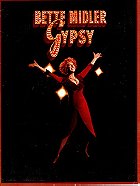 Posted : 12 years ago on 25 June 2013 06:55
(A review of Gypsy)
Posted : 12 years ago on 25 June 2013 06:55
(A review of Gypsy)A movie star is someone who not matter what, is always a movie star. And in the grand tradition of all-around entertainers, Bette Midler is a movie star. She has crafted a brazen, larger-than-life and gaudy showgirl persona through her stage, screen and television appearances. She is a grand dame presiding over us, frequently prone to fits of hyperbolic and bombastic emotions, yet never afraid to let a touch of messy spillover from her actual self boil over from time to time in her work.
Sometimes it’s hard finding the right type of role for a star to truly shine in, especially one with so idiosyncratic, specific and well-developed a personality as the Divine Miss M. But Gypsy allows for her to take that bawdy character and funnel it into a character type that can handle it. It also allows her to go for broke and give one hell of a performance.
There are numerous roles which any actress would be smart to covet in any form of live theater – Blanche Du Bois, Maggie the Cat, Mary Tyrone, Mrs. Lovett, The Witch in Into the Woods -- and Mama Rose has got to be one of them for actress over a certain age. The overbearing stage mother could easily fall into cliché territory, but there’s something about Mama Rose that keeps her fresh and original. Maybe it’s the forward drive and momentum, the success-at-all-costs ethos that drives her and her actions, or maybe it’s the way that she schemes and plots and, in the end, gets what she deserves that keeps her from falling too far into pure villainess territory. It doesn’t matter, because any production of Gypsy can survive a poorly chosen June or Louise (the titular character in this instance), but a poorly chosen Mama Rose is fatal. And one need only watch Midler’s take on “Rose’s Turn” to know that this is the kind of role that she was made for, and this, along with The Rose, are two great examples of her range as an actress and what makes her an iconic entertainer.
By and large, the supporting players are excellently chosen and know to step back and let Midler go-for-broke, because it’s her show through and through. Ed Asner does well with a small supporting role as Rose’s father, Peter Riegert as Herbie proves himself to be a talented song-and-dance man, Christine Ebersole, Linda Hart and Anna McNeely are a riot as a trio of experienced strippers, Lacey Chabert and Elisabeth Moss also due quite well as Baby June and Baby Louise. The only major player who doesn’t strike the right chord is Cynthia Gibb as Gypsy Rose Lee. She’s just adequate in the role, never bringing anything to it or making the transition from mousy to vixen believable in the slightest.
Gypsy is blessed with a quick pace; it really doesn’t ever feel like over two hours long, and a fantastic songbook with some truly memorable pieces. “Let Me Entertain You,” “Everything’s Coming up Roses,” “Together, Wherever We Go,” “Some People” and “You Gotta Get a Gimmick” are just a small sampling of the songs on display which carry on Sondheim’s tradition of clever lyrics and wordplay. While the film isn’t perfect, there are a few segments that drag a little bit towards the middle and end, but as propelled by Sondheim’s lyrics and Midler’s central performance, this version of Gypsy is without a doubt with a viewing.
Sometimes it’s hard finding the right type of role for a star to truly shine in, especially one with so idiosyncratic, specific and well-developed a personality as the Divine Miss M. But Gypsy allows for her to take that bawdy character and funnel it into a character type that can handle it. It also allows her to go for broke and give one hell of a performance.
There are numerous roles which any actress would be smart to covet in any form of live theater – Blanche Du Bois, Maggie the Cat, Mary Tyrone, Mrs. Lovett, The Witch in Into the Woods -- and Mama Rose has got to be one of them for actress over a certain age. The overbearing stage mother could easily fall into cliché territory, but there’s something about Mama Rose that keeps her fresh and original. Maybe it’s the forward drive and momentum, the success-at-all-costs ethos that drives her and her actions, or maybe it’s the way that she schemes and plots and, in the end, gets what she deserves that keeps her from falling too far into pure villainess territory. It doesn’t matter, because any production of Gypsy can survive a poorly chosen June or Louise (the titular character in this instance), but a poorly chosen Mama Rose is fatal. And one need only watch Midler’s take on “Rose’s Turn” to know that this is the kind of role that she was made for, and this, along with The Rose, are two great examples of her range as an actress and what makes her an iconic entertainer.
By and large, the supporting players are excellently chosen and know to step back and let Midler go-for-broke, because it’s her show through and through. Ed Asner does well with a small supporting role as Rose’s father, Peter Riegert as Herbie proves himself to be a talented song-and-dance man, Christine Ebersole, Linda Hart and Anna McNeely are a riot as a trio of experienced strippers, Lacey Chabert and Elisabeth Moss also due quite well as Baby June and Baby Louise. The only major player who doesn’t strike the right chord is Cynthia Gibb as Gypsy Rose Lee. She’s just adequate in the role, never bringing anything to it or making the transition from mousy to vixen believable in the slightest.
Gypsy is blessed with a quick pace; it really doesn’t ever feel like over two hours long, and a fantastic songbook with some truly memorable pieces. “Let Me Entertain You,” “Everything’s Coming up Roses,” “Together, Wherever We Go,” “Some People” and “You Gotta Get a Gimmick” are just a small sampling of the songs on display which carry on Sondheim’s tradition of clever lyrics and wordplay. While the film isn’t perfect, there are a few segments that drag a little bit towards the middle and end, but as propelled by Sondheim’s lyrics and Midler’s central performance, this version of Gypsy is without a doubt with a viewing.
 0 comments, Reply to this entry
0 comments, Reply to this entry
Dinotopia
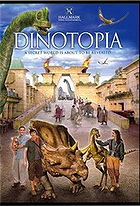 Posted : 12 years ago on 25 June 2013 06:55
(A review of Dinotopia)
Posted : 12 years ago on 25 June 2013 06:55
(A review of Dinotopia)How, who and why was it decided that this story needed FOUR HOURS to be told? It’s the flimsiest of plot lines that goes in the expected trajectory with no deviations from it, no surprises in the narrative along the way, yet it is still bloated and padded with loads of filler. Unfunny and contradictory elements abound, and I haven’t even begun to discuss the terrible acting or the strangest sense of wondering why so many talented British actors agreed to play supporting parts in this mess.
Dinotopia also has me worked up for a very simple reason: as someone who read the picture books as a kid, and some of the novels based on the property, this is not a good, fair or even decent treatment of the material. Jettisoning the Victorian setting, and the ingenious steam-punk images and gadgetry along with it, Dinotopia fails to find the correct amount of whimsy that the books possessed, transforming the culture into a thinly sketched thing and placing the power source into Sun Stones which somehow have the magical ability to ward off dangerous dinosaurs. There’s also the simplistic mantra of “Find the light” repeated ad nauseam, it makes Game of Thrones insistence on repeating “Winter is coming” look tame by comparison.
There is nothing going on with this story beyond the artifice on top. Sure, Dinotopia gets a middling grade from me, but it’s purely from a visual standpoint. I’m assuming most of the budget went into crafting lavish sets, costumes and, for the time and a TV-budget, pretty solid special effects work. While it never really does much to build up the culture or generate enough interest to make us care, Dinotopia does give us the building blocks to a grand fantasy world.
The problem is probably the involvement of Hallmark in making this thing. At all costs their increasingly lavish, and increasingly dwindling artistically, output of overly long fantastical TV mini-series’ must appeal to a broadly drawn audience. Yet the series is trying so very hard to make us feel awe and wonderment, nudging to the point of cattle-prodding us into gaining a reaction. There’s plenty of random and amateurish cuts to sweeping vistas populated with roaming dinosaurs and busy, but without any kind of eye for detail or sense of composition, shots of life in various cities and towns in the land. It’s hollow, eye candy for the sake of it without providing anything for these visuals to build upon like interesting characters or a dynamic plot.
To say the characters are 2D is an insult to 2D characters. They’re moronically bland and poorly acted by a trio of attractive but lifeless leads. Outsider half-brothers who must learn to love and respect each other while adjusting to life in this strange new world might sound like ripe dramatically fertile ground to explore, and in more capable hands it would’ve been even if well-known story beats were bound to occur. But here something as life-changing as their father’s supposed death is treated with a shrug and a let’s get going blankness. But Wentworth Miller and Tyron Leitso are very attractive to stare at, even if the words coming out of their mouths are both ridiculously stupid and delivered with all the believable emotionality of a coma patient.
But it’s not like any of the Dinotopian residents are given any better to work with. Katie Carr as Marion, the girl stuck in the non-existent love triangle between the two brothers and heir apparent to the ruling of the land, is plainly pretty, but has all of the emotional complexity of a doll. Worse yet, talented actors are stuck playing this stoic, noble characters with no dramatic weight to them whatsoever. Jim Carter and Alice Krige play Marion’s parents are the best example of this problem. They’re tradition-bound, staid and so in tune with community and peaceful living that there’s nothing engaging or interesting about them. Krige and Carter are often left adrift with nothing to do and looking quite bored or hammily overacting most of the time in order to try and spin this into some kind of gold.
There are adorable touches, clearly aimed at the youngest of viewers which demonstrate that maybe some charm could have done this thing a world of good. Leitso’s rebellious character getting stuck with a baby triceratops comes to mind, or his trying to teach a talking (the only dinosaurs that can actually speak English, while the rest talk in guttural moans and other animalistic sounds) dinosaur how to play table tennis. In general, the second episode is the “best” of the group as it finds a minor dramatic story to build itself upon. That one breaks the three characters up and sees them trying to learn the ways and skill-sets of Dinotopia. It’s not too much, but if the third episode had managed to build upon it more, then it would have turned out slightly better.
Then is also the overall looming issue of length. Four hours was totally unnecessary to completely tell this journey from start to finish, and stuffing in as much cute as possible doesn’t keep us engaged. Cute makes you feel like you ate too many sweets in one sitting without some kind of drama, depth or tension to build upon. Any chance to explore darker recesses of the mythology is quickly dissipated, lest we scare the children I guess.
I made it through all three episodes, because I hate quitting books, movies or TV shows no matter what. I committed to it so I have to see it through to the bitter end. As a fan of fantasy, there hasn’t been enough work put in to explain the logic of this world or careful thought into the everyday details. It’s like they took a random sampling of the images from the books and tried to reproduce them without much thought into the characters they would be populating the story with. As a dinosaur fan, well, there’s certainly plenty of that on display. To borrow a quote from a much better dinosaur property, they spared no expense.
Dinotopia also has me worked up for a very simple reason: as someone who read the picture books as a kid, and some of the novels based on the property, this is not a good, fair or even decent treatment of the material. Jettisoning the Victorian setting, and the ingenious steam-punk images and gadgetry along with it, Dinotopia fails to find the correct amount of whimsy that the books possessed, transforming the culture into a thinly sketched thing and placing the power source into Sun Stones which somehow have the magical ability to ward off dangerous dinosaurs. There’s also the simplistic mantra of “Find the light” repeated ad nauseam, it makes Game of Thrones insistence on repeating “Winter is coming” look tame by comparison.
There is nothing going on with this story beyond the artifice on top. Sure, Dinotopia gets a middling grade from me, but it’s purely from a visual standpoint. I’m assuming most of the budget went into crafting lavish sets, costumes and, for the time and a TV-budget, pretty solid special effects work. While it never really does much to build up the culture or generate enough interest to make us care, Dinotopia does give us the building blocks to a grand fantasy world.
The problem is probably the involvement of Hallmark in making this thing. At all costs their increasingly lavish, and increasingly dwindling artistically, output of overly long fantastical TV mini-series’ must appeal to a broadly drawn audience. Yet the series is trying so very hard to make us feel awe and wonderment, nudging to the point of cattle-prodding us into gaining a reaction. There’s plenty of random and amateurish cuts to sweeping vistas populated with roaming dinosaurs and busy, but without any kind of eye for detail or sense of composition, shots of life in various cities and towns in the land. It’s hollow, eye candy for the sake of it without providing anything for these visuals to build upon like interesting characters or a dynamic plot.
To say the characters are 2D is an insult to 2D characters. They’re moronically bland and poorly acted by a trio of attractive but lifeless leads. Outsider half-brothers who must learn to love and respect each other while adjusting to life in this strange new world might sound like ripe dramatically fertile ground to explore, and in more capable hands it would’ve been even if well-known story beats were bound to occur. But here something as life-changing as their father’s supposed death is treated with a shrug and a let’s get going blankness. But Wentworth Miller and Tyron Leitso are very attractive to stare at, even if the words coming out of their mouths are both ridiculously stupid and delivered with all the believable emotionality of a coma patient.
But it’s not like any of the Dinotopian residents are given any better to work with. Katie Carr as Marion, the girl stuck in the non-existent love triangle between the two brothers and heir apparent to the ruling of the land, is plainly pretty, but has all of the emotional complexity of a doll. Worse yet, talented actors are stuck playing this stoic, noble characters with no dramatic weight to them whatsoever. Jim Carter and Alice Krige play Marion’s parents are the best example of this problem. They’re tradition-bound, staid and so in tune with community and peaceful living that there’s nothing engaging or interesting about them. Krige and Carter are often left adrift with nothing to do and looking quite bored or hammily overacting most of the time in order to try and spin this into some kind of gold.
There are adorable touches, clearly aimed at the youngest of viewers which demonstrate that maybe some charm could have done this thing a world of good. Leitso’s rebellious character getting stuck with a baby triceratops comes to mind, or his trying to teach a talking (the only dinosaurs that can actually speak English, while the rest talk in guttural moans and other animalistic sounds) dinosaur how to play table tennis. In general, the second episode is the “best” of the group as it finds a minor dramatic story to build itself upon. That one breaks the three characters up and sees them trying to learn the ways and skill-sets of Dinotopia. It’s not too much, but if the third episode had managed to build upon it more, then it would have turned out slightly better.
Then is also the overall looming issue of length. Four hours was totally unnecessary to completely tell this journey from start to finish, and stuffing in as much cute as possible doesn’t keep us engaged. Cute makes you feel like you ate too many sweets in one sitting without some kind of drama, depth or tension to build upon. Any chance to explore darker recesses of the mythology is quickly dissipated, lest we scare the children I guess.
I made it through all three episodes, because I hate quitting books, movies or TV shows no matter what. I committed to it so I have to see it through to the bitter end. As a fan of fantasy, there hasn’t been enough work put in to explain the logic of this world or careful thought into the everyday details. It’s like they took a random sampling of the images from the books and tried to reproduce them without much thought into the characters they would be populating the story with. As a dinosaur fan, well, there’s certainly plenty of that on display. To borrow a quote from a much better dinosaur property, they spared no expense.
 0 comments, Reply to this entry
0 comments, Reply to this entry
The Golden Touch
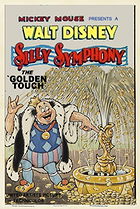 Posted : 12 years ago on 23 June 2013 10:45
(A review of The Golden Touch (1935))
Posted : 12 years ago on 23 June 2013 10:45
(A review of The Golden Touch (1935))"The Golden Touch" still resonates, both as a fable and as this short film, because of the way in which it tackles the problem of being too greedy and placing the wrong emphasis on things in life so head on. It's a pity then that this short film is so ordinary, even with Uncle Walt at the head of it.
None of the songs stick in your mind, there's quite a few clever visual details, and the somber turn the myth must takes is handled effectively. But there's still a nagging feeling of something vital missing from this treatment of the King Midas myth. To paraphrase and take a turn into pun-territory, it is missing the "golden touch" itself. Sorry, I know there was a groan you had to let out there and I don't blame you.
Economic storytelling, usually one of Disney's great trademarks, is absent here by and large. Ten minutes isn't really all that long to tell a story in an animated short, but the story of Midas, while packing a large punch in the morality department, is pretty quick. It would've had a stronger impact if it had been shorter and gotten to the point much quicker. The scene of Midas dancing and singing and taking great joy in his new-found gift goes on for a bit too long.
The ending is also a bit of a problem. Not in that Midas loses everything, that's a nice touch, but that it ends on a joke in which he's happiest eating a hamburger. "The Ugly Duckling" wasn't afraid to give us a more quiet, dramatic ending, and "The Golden Touch" would've been better served with a somber turn of events. There's an impact to this short and it does quite a bit well, but the overall impression is one of missed opportunities and generally unimpressive results.
None of the songs stick in your mind, there's quite a few clever visual details, and the somber turn the myth must takes is handled effectively. But there's still a nagging feeling of something vital missing from this treatment of the King Midas myth. To paraphrase and take a turn into pun-territory, it is missing the "golden touch" itself. Sorry, I know there was a groan you had to let out there and I don't blame you.
Economic storytelling, usually one of Disney's great trademarks, is absent here by and large. Ten minutes isn't really all that long to tell a story in an animated short, but the story of Midas, while packing a large punch in the morality department, is pretty quick. It would've had a stronger impact if it had been shorter and gotten to the point much quicker. The scene of Midas dancing and singing and taking great joy in his new-found gift goes on for a bit too long.
The ending is also a bit of a problem. Not in that Midas loses everything, that's a nice touch, but that it ends on a joke in which he's happiest eating a hamburger. "The Ugly Duckling" wasn't afraid to give us a more quiet, dramatic ending, and "The Golden Touch" would've been better served with a somber turn of events. There's an impact to this short and it does quite a bit well, but the overall impression is one of missed opportunities and generally unimpressive results.
 0 comments, Reply to this entry
0 comments, Reply to this entry
The Wise Little Hen
 Posted : 12 years ago on 23 June 2013 10:24
(A review of The Wise Little Hen)
Posted : 12 years ago on 23 June 2013 10:24
(A review of The Wise Little Hen)"The Wise Little Hen" will be of eternally significance to film history for one very simple reason: it's the cartoon that introduced Donald Duck. That's pretty much the only reason though. "Wise Little Hen" is never terrible, but there's nothing really remarkable or lasting about its storyline or images.
A matronly and sweet little hen and her chicks are going about planting, harvesting and cooking with her crop of corn. Along the way she asks Donald Duck and Peter Pig who continually feeds her stories about having tummy aches despite constantly being found dancing, singing and having a good time and abruptly stopping the moment she asks them for help. That is, until she asks them to help her eat the fruits of her labor. Her final trick on them is very clever and well-deserved, pretending to give them a basket full of corn bread and it turning out be a vial of castor oil instead. And that's probably the funniest bit in the entire cartoon. It's not much of an entry in the Silly Symphonies canon apart from the first appearance of Donald Duck.
A matronly and sweet little hen and her chicks are going about planting, harvesting and cooking with her crop of corn. Along the way she asks Donald Duck and Peter Pig who continually feeds her stories about having tummy aches despite constantly being found dancing, singing and having a good time and abruptly stopping the moment she asks them for help. That is, until she asks them to help her eat the fruits of her labor. Her final trick on them is very clever and well-deserved, pretending to give them a basket full of corn bread and it turning out be a vial of castor oil instead. And that's probably the funniest bit in the entire cartoon. It's not much of an entry in the Silly Symphonies canon apart from the first appearance of Donald Duck.
 0 comments, Reply to this entry
0 comments, Reply to this entry
The Grasshopper and the Ants
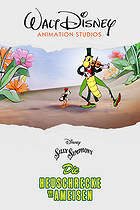 Posted : 12 years ago on 23 June 2013 10:12
(A review of The Grasshopper and the Ants)
Posted : 12 years ago on 23 June 2013 10:12
(A review of The Grasshopper and the Ants)"The Grasshopper and the Ants" is one of those stories that everyone clearly knows, or at least has a vague idea of the mechanics of the plot. And this Silly Symphonies short adapts it quite faithfully. Although hearing Goofy's very specific voice come out of another character takes a minute of adjustment, the short is quite worth a viewing.
Seemingly building upon Depression-era audiences ideas about how best to deal with the "winter" they were stuck in, the short deals in morality and life choices. Does one chose the life of lazy approach and assume someone else will take care of it for them, or does one act industriously and try to do something about the situation? Clearly, the fable and short film preach against laziness, as they should, and by the end the grasshopper has reformed. Of course, a few months of starvation and eternally feeling cold will do that for a person.
No matter, "The Grasshopper and the Ants" is an early three-strip Technicolor gem. Maybe not as perfect as other shorts from the same era, but definitely solidly built and highly enjoyable. The transitions from spring to winter and from near-death blue to the grasshopper's healthier yellow-green color are both expertly done and quite lovely to look at. They are smooth transitions which don't call a great deal of attention to themselves, but are simply noticeable to someone who appreciates animation and the various techniques and planning that goes into it.
Seemingly building upon Depression-era audiences ideas about how best to deal with the "winter" they were stuck in, the short deals in morality and life choices. Does one chose the life of lazy approach and assume someone else will take care of it for them, or does one act industriously and try to do something about the situation? Clearly, the fable and short film preach against laziness, as they should, and by the end the grasshopper has reformed. Of course, a few months of starvation and eternally feeling cold will do that for a person.
No matter, "The Grasshopper and the Ants" is an early three-strip Technicolor gem. Maybe not as perfect as other shorts from the same era, but definitely solidly built and highly enjoyable. The transitions from spring to winter and from near-death blue to the grasshopper's healthier yellow-green color are both expertly done and quite lovely to look at. They are smooth transitions which don't call a great deal of attention to themselves, but are simply noticeable to someone who appreciates animation and the various techniques and planning that goes into it.
 0 comments, Reply to this entry
0 comments, Reply to this entry
 Login
Login
 Home
Home 95 Lists
95 Lists 1531 Reviews
1531 Reviews Collections
Collections